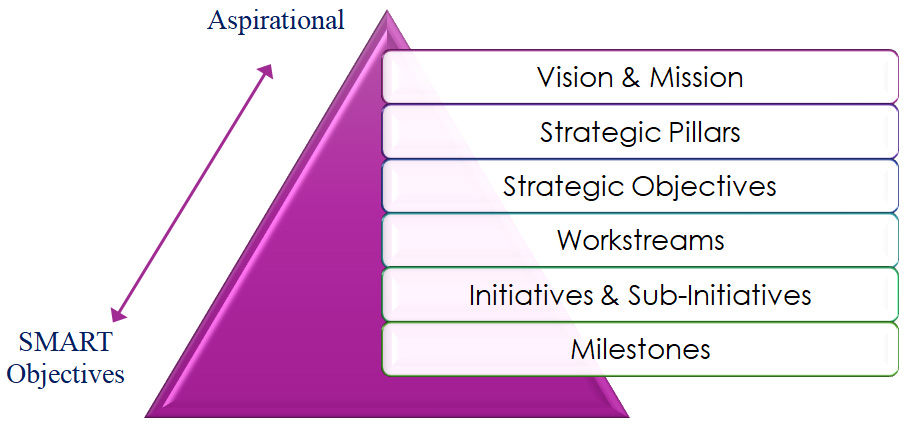Strategy & Intelligence
Astute Advisory has extensive practical experience in the development and implementation of organisational strategies across a diverse range of industries.
Extensive assessment is undertaken to understand the organisation, the industry and the performances against the desired state. The gap analysis supports the development of the strategic building blocks before strategic objectives are applied to quantify the journey. The 3Cs Strategy Model is allows for an international recognised framework in Strategy Development.
Comprehensive industry, market & functional insights are vital in the development & application of the strategy, while it is the understanding of dynamic market changes that forms an intelligent assessment of the strategy.
A well curated strategy is a significant milestone, but the implementation journey is the true barometer of success.
We have developed implementation models which have been the foundation of successful strategy implementation.

 Strategy Development & Implementation is the disciplined process of defining an organization's long-term direction, establishing clear objectives, and formulating actionable plans to achieve them.
Strategy Development & Implementation is the disciplined process of defining an organization's long-term direction, establishing clear objectives, and formulating actionable plans to achieve them.
It requires rigorous analysis of market dynamics, competitive positioning, and internal capabilities to identify growth opportunities and mitigate risks. Effective implementation ensures that strategic priorities are translated into measurable initiatives, with resources, structures, and performance metrics aligned to drive execution.
By bridging vision with operational reality, Strategy Development & Implementation enables organizations to achieve sustainable growth, resilience, and competitive advantage.
 Organisational Structural Design & Implementation is the process of creating and deploying the optimal framework that defines how roles, responsibilities, reporting lines, and decision-making authority are arranged within an organization.
Organisational Structural Design & Implementation is the process of creating and deploying the optimal framework that defines how roles, responsibilities, reporting lines, and decision-making authority are arranged within an organization.
It involves aligning the structure with the company's strategy, operating model, and growth objectives to ensure clarity, efficiency, and accountability across all functions. Effective implementation goes beyond design by embedding the structure into daily operations, enabling seamless collaboration, streamlined workflows, and enhanced agility.
This ensures that people, processes, and governance mechanisms are positioned to deliver sustainable performance and long-term value.
 Transformation & Change Management is the structured approach to guiding organizations through significant shifts in strategy, operations, or culture, ensuring that change initiatives are effectively planned, communicated, and adopted. It involves assessing the impact of change, engaging stakeholders, and aligning leadership, processes, and systems to support new ways of working.
Transformation & Change Management is the structured approach to guiding organizations through significant shifts in strategy, operations, or culture, ensuring that change initiatives are effectively planned, communicated, and adopted. It involves assessing the impact of change, engaging stakeholders, and aligning leadership, processes, and systems to support new ways of working.
By combining strategic vision with practical execution, Transformation & Change Management minimizes disruption, accelerates adoption, and embeds sustainable improvements, enabling organizations to achieve desired outcomes, enhance performance, and remain competitive in dynamic markets.
 Macro-Economic & Country Analysis is the systematic evaluation of a country's economic, political, and social environment to inform strategic decision-making. It involves examining key indicators such as GDP growth, inflation, fiscal and monetary policies, trade dynamics, regulatory frameworks, and geopolitical risks to assess opportunities and potential challenges for business operations or investments.
Macro-Economic & Country Analysis is the systematic evaluation of a country's economic, political, and social environment to inform strategic decision-making. It involves examining key indicators such as GDP growth, inflation, fiscal and monetary policies, trade dynamics, regulatory frameworks, and geopolitical risks to assess opportunities and potential challenges for business operations or investments.
By combining quantitative data with qualitative insights, this analysis provides a comprehensive understanding of market conditions, enabling organizations to make informed, risk-aware decisions, optimize market entry strategies, and identify avenues for sustainable growth in specific countries or regions.
 Feasibility Analysis is the structured process of evaluating the practicality, viability, and potential success of a proposed project, initiative, or business opportunity. It examines key factors such as market demand, technical requirements, financial projections, operational capabilities, legal and regulatory considerations, and associated risks.
Feasibility Analysis is the structured process of evaluating the practicality, viability, and potential success of a proposed project, initiative, or business opportunity. It examines key factors such as market demand, technical requirements, financial projections, operational capabilities, legal and regulatory considerations, and associated risks.
By systematically assessing these dimensions, feasibility analysis helps organizations determine whether a project is worth pursuing, identify potential challenges, and develop strategies to mitigate risks. Ultimately, it provides decision-makers with a clear, evidence-based understanding of the likelihood of achieving desired outcomes before committing significant resources.
 ESG Strategy & Organisational Alignment is the process of integrating Environmental, Social, and Governance (ESG) principles into an organization's core strategy and operations to drive sustainable value creation. It involves defining ESG priorities based on stakeholder expectations, regulatory requirements, and industry benchmarks, and embedding them into corporate policies, governance structures, and performance metrics.
ESG Strategy & Organisational Alignment is the process of integrating Environmental, Social, and Governance (ESG) principles into an organization's core strategy and operations to drive sustainable value creation. It involves defining ESG priorities based on stakeholder expectations, regulatory requirements, and industry benchmarks, and embedding them into corporate policies, governance structures, and performance metrics.
Organisational alignment ensures that leadership, teams, and processes are collectively oriented toward achieving ESG objectives, fostering a culture of accountability, transparency, and ethical decision-making. By linking ESG strategy to business goals, organizations can enhance resilience, strengthen reputation, and create long-term positive impact for both stakeholders and society.
 Development & Operationalisation of Socio-Economic Projects is the end-to-end process of designing, planning, and implementing initiatives that generate measurable social and economic impact.
Development & Operationalisation of Socio-Economic Projects is the end-to-end process of designing, planning, and implementing initiatives that generate measurable social and economic impact.
It involves identifying community needs, defining objectives, assessing feasibility, mobilizing resources, and establishing governance and operational frameworks to ensure effective execution. Operationalisation translates project plans into actionable activities, aligning stakeholders, processes, and performance metrics to achieve desired outcomes.
This approach ensures that socio-economic projects are not only well-conceived but also sustainably managed, delivering tangible benefits to communities while supporting broader development goals.
 Capacity Building & Development Project Impact Assessments is the systematic process of evaluating the effectiveness and outcomes of initiatives aimed at enhancing the skills, capabilities, and performance of community socio-economic projects.
Capacity Building & Development Project Impact Assessments is the systematic process of evaluating the effectiveness and outcomes of initiatives aimed at enhancing the skills, capabilities, and performance of community socio-economic projects.
It involves measuring the extent to which capacity-building interventions achieve their intended objectives, assessing improvements in knowledge, competencies, and operational efficiency, and identifying the broader socio-economic impacts.
By combining qualitative and quantitative analysis, these assessments provide evidence-based insights that inform decision-making, optimize future interventions, and ensure that development projects deliver sustainable, measurable value to beneficiaries and stakeholders.


Let's Build Future Together.























